Reheating food is always a tempting convenience, but did you know there are some foods you should never reheat in a microwave?
It's a wonder we managed in pre-microwave times. Nowadays, most kitchens have one, and we use them for almost everything, from heating up our porridge to cooking our ready meals.
Microwaves may be a wonderful invention, but that's not to say they can do everything. Discover which foods you should never put in your microwave today, or risk poisoning yourself, and family!
WAIT! Before continuing, be sure to sign up to the Expert Home Tips newsletter to get even more home hacks, living tips, competitions and more.
1. Can I microwave celery?
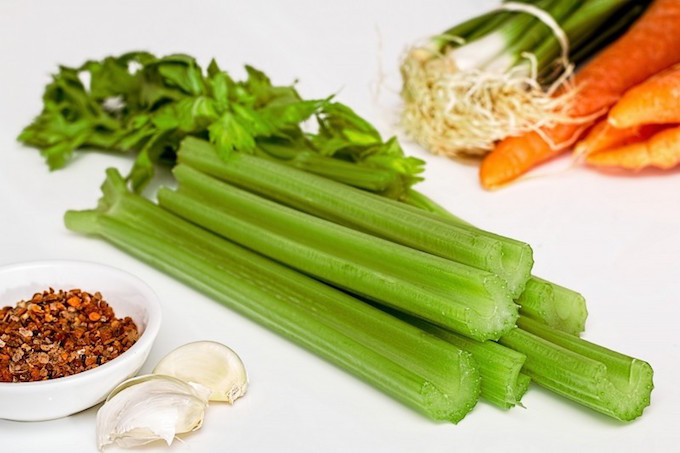
Although celery is usually eaten raw, it's sneaked into lots of other store-bought foods such as soup and even bolognese.
Celery contains nitrates, which, when reheated, can turn toxic, releasing carcinogenic properties. Carcinogens are substances or environments that can cause changes in a cell's DNA, and lead to cancer.
Reheating food rich in nitrates should be avoided where possible.
2. Microwave beetroot
Like celery, beetroot is also often eaten raw - this is perhaps due to it's unsuitability to being reheated. Just like celery, beetroot contains nitrates which can produce carcinogens when reheated.
Try to avoid reheating beetroot by removing it out of your meals before you zap them in the microwave.
3. Microwave spinach
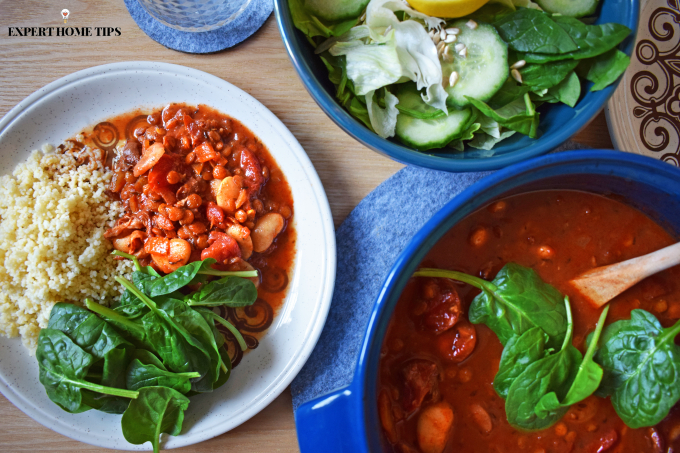
Spinach is also on the list of vegetables that could develop harmful carcinogens when reheated. What's more, spinach rarely tastes as good when reheated a second time.
Do your taste buds and your health a favour and leave it out of the microwave.
4. Can you reheat an omelette?
It's time for egg debate. Whilst more and more people are turning to their microwaves to scramble their eggs in the morning (and who can really blame them? It saves on mess and time), the same cannot be said for reheating.
The problem with reheating eggs in the microwave is that, often, they are not heated for long enough. If eggs are eaten at temperatures lower than 74°C, they can upset your stomach and even cause food poisoning.
If you're lucky enough to have some leftover omelette for dinner, your best bet is the frying pan. Heat it in a non-stick pan for a few minutes on each side and enjoy piping hot.
5. Can you reheat mushrooms
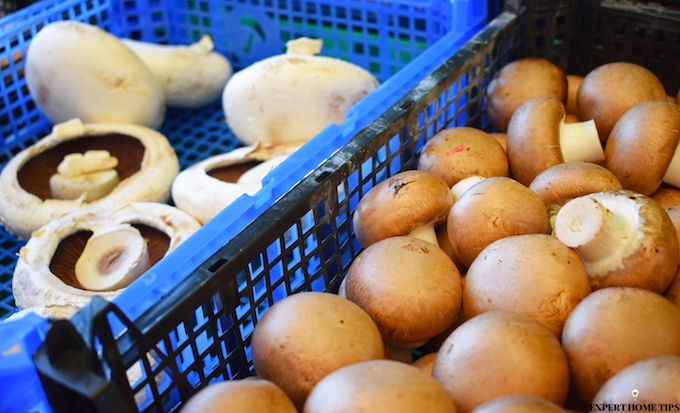
Linguini, stroganoff, risotto...most of us wouldn't even think twice about reheating our favourite mushroom dishes.
The problem with reheating food containing mushrooms is not the microwave itself, but the bacteria they develop between being cooked and reheated. If they are not refrigerated immediately after cooking, their complex enzymes and protein structure can be destroyed.
Once this has happened, reheated mushrooms are unsafe to eat and can cause stomach upsets.
6. How to reheat potatoes...
...the answer most definitely isn't in the microwave. Similarly to mushrooms, if stored incorrectly, potatoes can grow a bacteria called Clostridium botulinum, which can be extremely harmful when ingested.
Bacteria can be killed off at high temperatures, such as those achieved in the oven, but microwaving potatoes is always risk. To avoid tummy troubles, always store potatoes immediately at cold temperatures and do not eat below 60°C.
7. Reheating chicken
Unsurprisingly, chicken is on our list of foods you shouldn't reheat in the microwave. It's not that you can't reheat chicken, it's just not advised. Chicken contains a high-density of proteins which reheating can cause to break down, thus upsetting the stomach.
Additionally, as with eggs, there's a risk of salmonella. The problem with reheating food in the microwave is that they don't distribute heat evenly, meaning some parts of your chicken will be safe to eat, and others less so.
8. Reheating rice
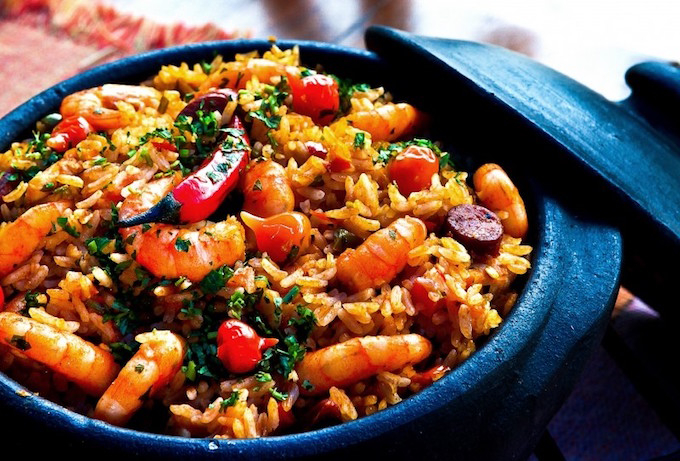
Another controversial food for reheating is rice. Similarly to mushrooms and potatoes, if left out at room temperature, rice can develop spore-forming bacteria. Spores are a sort of 'shell' that develop around harmful bacteria, and prevent them from being broken down even at high temperatures.
Reheating rice in the microwave is not enough to get rid of these poisons, which are likely to cause vomiting or diarrhoea when ingested.
We hope you found this article helpful! It's not just your food you should be worried about, but your containers too. Read our articles on whether you can put glass in the microwave and learn which types of glass are oven-safe.
Do you have an alternative method of reheating? Share your tips with us in the comments below.
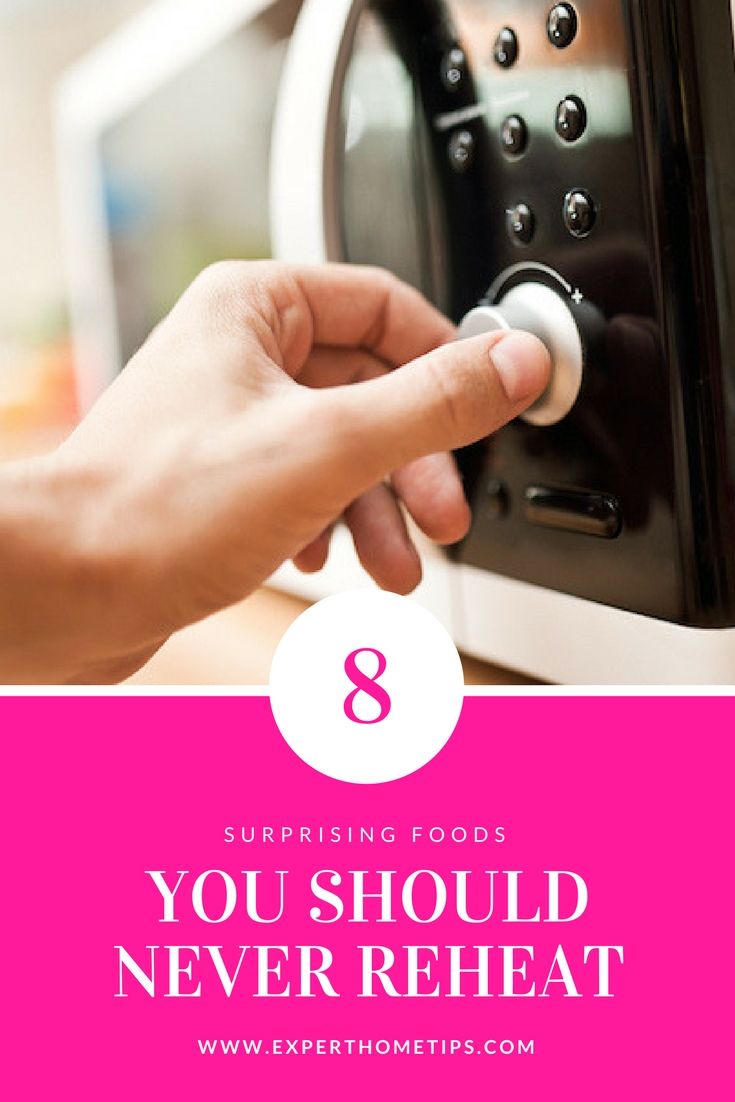
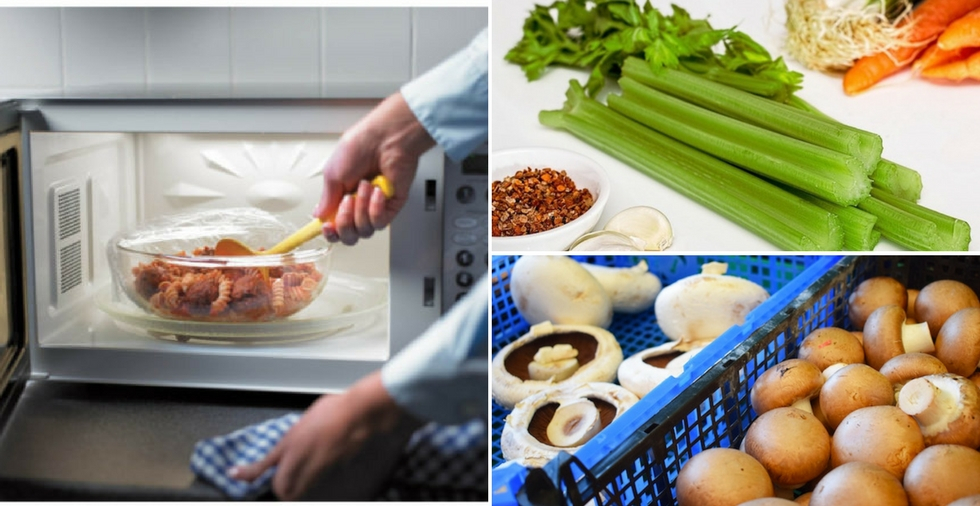
I have always cooked celery in the microwave, before adding to soups or stews, are you saying it should never be cooked in the microwave, or is it just reheating ?
Hi Rosemary. It's the reheating process that's the problem, not the cooking, so you should be fine :) I hope this helps!
Bummer! I put celery and mushrooms in my stews, so I'm not supposed to re-heat them. Even when I've had eight pints of brown ale down at the rub-a-dub and I'm home and I'm Hank Marvin. Not likely! I'm gonna whack that Looby Loo in the old nuclear oven and give it 4 mins on the 'destroy' setting. Then I'm gonna sit down in front of the telly for Family Guy and scoff it down my neck and dribble it all over my shirt. Probably wake up three hours later in the armchair with the telly still blaring out.
John mate your doing it wrong, I just half cook it all and let the vodka take care of it after.
I OFTEN USE A HOT AIR COOKER, IS THIS A SAFE WAY OF RE-HEATING?
Hey Michael! As long as you are following correct reheating procedures, you shouldn't have any problems using an air fryer/cooker for this purpose.
Wow! That's my life ruined!! Not really, but potato, mushroom and celery are all in my regularly nuked to reheat list. Stove-top it is then, thanks.
Hi Lorna. Shocking isn't it! Reheating every now and then shouldn't do TOO much harm, it depends how strict you want to be with it.
So would reheating these foods on a pan on the cooker be less harmful?
Hi Sarah. The hob is preferable as the food reaches a hotter temperature and is also heated more evenly, which is essential to removing some of the harmful bacteria mentioned in the article. I hope this helps :)
If food is cooked thoroughly the first time, how is the salmonella going to grown during microwaving? I'm not sure where you got your info from but this "info" makes no sense.
Hi Caroline, Food can grow bacteria in between the time it is first cooked, and the reheating. The microwave isn't always powerful enough/food is not reheated hot enough to kill all of this bacteria. I hope this helps.
Why are so many people so intent on shoving things in the microwave?? Microwaves are for pre-made things, and reheating simple things like pasta or soup. Why are you putting eggs in the microwave? Potatoes? Pancakes?? Please just stop, OF COURSE they are coming out gross.
Hopefully, our article will help people to understand this too.
Well it’s definitely interesting and I’m not disputing it, but i eat 6 meals a day and I’ve been prepping my meals in advance for years and regularly reheat rice, chicken, potatoes amongst others and I can’t say I’ve ever had any issues. But as I say I’m not disputing anything, just starting discussion. Thanks for the article.
That's interesting, Lee! Thanks for sharing.
Can we reheat cooked foods such as spinach, beet and celery on the stove top. Will this also lead to release of carcinogenic substances? Do we have the discard such foods stored in fridge?
Hi Sneha, we'd suggest that you avoid reheating them altogether.
What happens to the nitrates in beetroot during the first cooking (heating). Is it dangerous to eat cooked beetroot and celery?
Hi, it's fine to heat the first time. It's only when reheated that it could be a problem.
Not convincing, I am afraid. Kindly explain the difference - what happens when you reheat beets.
In order to reheat something, you must blast it at a high heat. This is where the problem comes when compared to regular cooking. When reheated at a high temperature - which is the only safe way to reheat food - the nitrates turn toxic (forming nitrosamines) and release carcinogenic properties. These carcinogens are similar to those found in tobacco smoke- so not what you want to be eating!
So is it safer to just eat a cooked potato omelette cold the next day? Rather than microwaving?
Hi Laz, you could eat it cold the next day as long as it has been properly refrigerated.
can i reheat ready brek made with water ?
Hi Babs! You shouldn't reheat ready brek as per the instructions.
Where is the scientific evidence that proves all that you say. I have read the opposite of what you say.
Hi Jane. May I ask where you have read the opposite?
I am 92 years of age and I am still learning !! Thank you for all the advice on re-heating, I have never done that with food But I am pleased to know it is not safe Thank you.
Hi Veronica! We're glad we could help.
How about bought chilled soups? Eg. Mushroom or beetroot. If they go straight from the fridge to the microwave are they safe? If not shouldn’t there be a warning, as that’s what everyone does.
Hi Barbara! Chilled soups will be perfectly fine.
Hmmmm, can I ask if store bought tinned chicken soup, or tinned vegetable soup containing carrots and/or celery is therefore not safe? Or is it safe to heat these soups in a pan on the cooker but not microwaved?
Store-bought soups are absolutely fine!
Hi Joanne, thanks for the reply, but I am still a little confused. A store bought soup is pre cooked isn’t it? and if I am heating it back up in a saucepan how will the reheated potato, celery and carrots not form nitrates??? I like to make my own vegetable soup at home in large batches and these contain potatoes, carrots and celery. So is it safe to reheat this soup in a saucepan? or should I avoid reheating my soup altogether? Regards, Mark
I'm confused too. I also make soup in large quantities that contain celery sometimes spinach, kale or potatoes which I refrigerate straight away. Are these still harmful if reheated. If so why aren't shop bought soup etc harmful? ? Thanks Jane
Hi there! As long as you don't reheat it more than once, it will be fine.
"Another controversial food for reheating is rice. Similarly to mushrooms and potatoes, if left out at room temperature, rice can develop spore-forming bacteria." ...Reheating rice in the microwave is not enough to get rid of these poisons, which are likely to cause vomiting or diarrhoea when ingested. SO if you just take rice direct from refrigerator to e.g. microwave there should be no problem. I've reheated e.g. fried rice many times without problem.
Hi Scott! Would the rice have been chilled quickly enough to prevent the development of spore-forming bacteria?
I've reheated all of the above for 35 years plus and never had a problem. Where's the evidence to back all this up rather than than just what Sarah (or whatever her name is) says?
You must be very lucky!
The spinach myth was debunked by a student in Hong Kong back in 2016. The original 'advice' came from (where else?) the EU and was not based on thorough scientific evidence but on what 'could' happen if food was not stored correctly. I reckon that if I spent enough time searching the internet I could find counter arguments for all of these supposed health issues. Bottom line is - cook, cool and store your food correctly and if you reheat it correctly (i.e. hot enough) you are unlikely to have any problems. The main issue I can see is that reheated food is not as nutritious and not always as nice!
Very true, Anne! Reheated food doesn't taste as good as it does fresh.
I find one of the better ways of re-heating IS PUTTING THE FOOD ON A PLATE AND COVER WITH ANOTHER. THEN RE-HEAT OVER THE OTHER VEGETABLES BEING BOILED. WORKS FOR ME.
Maybe an idea would be to approach this from the other way - just make the right amount of food for your meal to begin with, then there won't be any leftovers to worry about re-heating. :-)
That's not a bad idea, though not always easily done if you live alone!
Interesting list. I was brought up and remain a vegetarian, so I can't comments on chicken or eggs (virtually vegan), but this seems to be about reheating, not just microwave reheating. I can confirm that I have happily reheated (I am microwave man) cooked potatoes, mushrooms, rice etc. since I left home at 18 to go to university. I live to tell the tale at approaching 60 and expect a few more years to come. My view? I ignore the sell-by/best-before etc dates and any overy cautious thinking. I rely on ALL of the senses that nature provided as they rarely fail to tell me when things are not good to eat. Works for me, but I would respect those that would take more caution.
That's fair enough!
Can I heat celery for the first time (not reheat)? I’m allergic to pectin but heating apples, celery etc seems to kill off the pectin.
Heating celery for the first time is safe and common in cooking. However, if you have a pectin allergy, it is essential to avoid foods containing it and consult a healthcare professional for personalized advice.
I've reheated chicken, mushrooms, rice , potatoes, and even an omelette. Stirring through or moving around during heating, and making sure it's piping hot, is something I always do. So far so good. I'm not dead or been poisoned up to now. I'll carry on but will note the advice
That's fair enough, Sonya!
Wow... that's really interesting. Your page came up when I searched if I could reheat beetroot that I've bought from the supermarket. It's cooked and packaged in plastic so you've answered my question... thank you. Now I'm worried about when I make fried rice containing carrot, onion, celery, spinach leaves, cooked egg and sometimes chicken or prawn meat or bacon and pineapple. I generally make a large wokful, divide it up and freeze in mealsize containers. Is that bad for me? Also wondering if it would be better if I used hokien noodles instead of rice.
It is safe to freeze and reheat fried rice with various ingredients if handled and stored correctly. The choice between rice and Hokkien noodles depends on personal dietary preferences and needs.
I recently read that you should let rice come to room temperature before putting in in the refrigerator. In order to keep it from getting hard in the middle
Letting cooked rice come to room temperature before refrigerating it can prevent it from becoming hard in the middle. This is because cooling hot rice can cause condensation, creating a moist environment that promotes the growth of bacteria and leads to uneven texture.
That was great to find out. Very informative. Would you know if it is ok to re heat a cup of coffee, that has gone cold. Many thanks Martyn.
We wouldn't recommend it, as it's likely to alter the taste.
Thank you for all your information on re-heating food in the microwave, Especially Chicken.
You're very welcome!